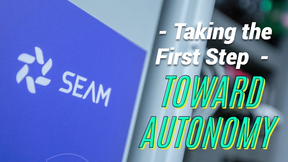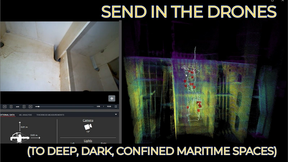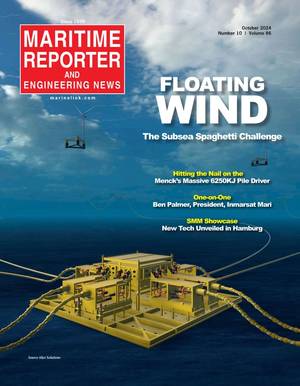Techcross to Take Part in Posidonia 2024
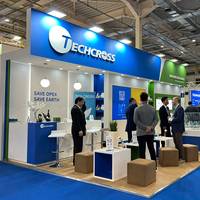
South Korea-based ballast water management system (BWMS) manufacture Techcross has announced its participation at Posidonia 2024, considered one of the largest maritime exhibitions in Europe held in Athens, Greece.This year, over 2,000 companies from around the world are expected to participate in the first week of June. The exhibitors are working hard in preparation aiming to attract nearly 30,000 visitors.Techcross who attends at booth no. 2.424, has arranged an opportunity for consultation on the local training center’s operational plan…
Techcross Establishes a 'Smart Factory'
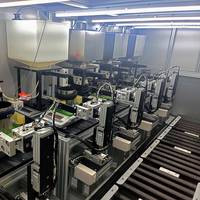
Techcross is accelerating the completion of its smart process and the establishment of an AI-based database.Techcross completed the automation of its coating liquid mixing process at the end of last year after being selected for the ‘2021 Smart Factory Establishment and Advancement Project’, which was hosted by the Ministry of SMEs and Startups, and funded with approximately $550k. The key objective was to reduce errors by introducing an automation process for making the coating mixture…
Alfa Laval Starts New PureBallast 3 Production Line in China
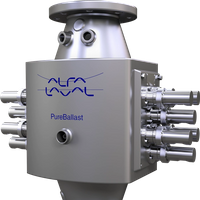
Alfa Laval will soon fire-up its new production line for Alfa Laval PureBallast 3 in Qingdao, China.According to Alfa Laval, the majority of PureBallast 3 installations occur at Asian shipyards, even when the vessels themselves are flagged in other regions. When the global wave of ballast water treatment system retrofits begins to subside in 2024, Asian shipyards will become even more dominant as the focus shifts to newbuilding. “We are growing with our customers, and the future of ballast water treatment installations is undoubtedly in Asia,” says Peter Sahlén, Head of Alfa Laval PureBallast.
Damen Intros BWPF Barge
Dutch shipbuilding conglomerate Damen Shipyards Group has unveiled a Ballast Water Pre Filtration Barge (BWPF) to assist vessels in complying with the IMO's Ballast Water Management Convention.The new legislation came into force on September 8th 2019 and Damen Green Solutions has prepared a range of products and services to assist its clients in meeting the requirements of the new legislation.The globally operating company with more than 50 shipyards, repair yards, and related companies said in a press note that the BWPF Barge can process up to 4,000 m3 water per hour with a sediment level anything between 50 and 1,500 mg per liter.Filtration is available between 10 and 50 micron, to suit varying sediment sizes.
BIO-UV in Chinese BWTS Partnership
French ballast water treatment specialist BIO-UV Group has strengthened its global partnership network with Hai Cheung Trading (HCT), a specialist marine equipment supplier based in Hong Kong to reinforce the commercial rollout of BIO-SEA ballast water treatment system across Asia.BIO-UV Group will draw on HCT’s extensive network of Chinese shipyards with a view to accelerate the take-up the of the BIO-SEA systems across the region, strengthening the French company’s presence in Asia.Benoit Gillmann, CEO and founder of BIO-UV Group, said: “We are delighted to have entered into this highly strategic partnership with Hai Cheung. By teaming up with a benchmark supplier in China’s shipbuilding market…
Jongen Deploys Damen's Mobile BWTS
German maritime waste specialist Jongen GmbH has taken delivery of a Damen InvaSave 300 mobile ballast water treatment system (BWTS), which will protect the Elbe from invasive Species.Jongen can now offer IMO-certified ballast water treatment services to ship operators needing to comply with the latest ballast water regulations that came into effect on 8 September 2019.Jongen GmbH delivers waste oil, waste water, and the waste removal services for maritime traffic in the Port of Hamburg. The company’s services include the cleaning of the ships’ storage tanks and machinery along with the management and cleaning of oil spills.The addition…
BWM Convention Modification Enter into Force
The amendments to an international treaty aimed at preventing the spread of potentially invasive species in ships’ ballast water came into force yesterday (October 13), the International Maritime Organization (IMO) said.Ships regularly take on sea water, in tanks, to ensure their stability. Known as ballast water, this can contain many aquatic species, including in microscopic or larval form. These can become invasive and harmful if the ballast water is released, unmanaged, in a new location at the end of an ocean voyage.The International Convention for the Control and Management of Ships' Ballast Water and Sediments, 2004 (the BWM Convention) was adopted by IMO, a specialized agency of the United Nations, to address this problem.The BWM Convention entered into force in 2017.
Offshore Boosts Optimarin Growth
Ballast water treatment (BWT) specialist Optimarin said that the recovery of the offshore shipping segment is playing a key role in driving its revenues to new heights.The Stavanger, Norway-based business, which has focused exclusively on BWT for the last 25 years, has just signed a number of fleet agreements, including a contract with Island Offshore for 19 systems, doubling its order intake year on year.“Optimarin has long held the position of the preferred supplier to the offshore segment, so the fact that the industry is recovering – with fewer vessels laid up – is a very positive development for us,” comments Tore Andersen, EVP Sales…
Ecochlor to Retrofit Euronav Tankers
Connecticut-based ballast water treatment solutions provider Ecochlor announced a contract to supply seven Euronav Suezmax and VLCC tankers with a ballast water management system (BWMS).According to Ecochlor, the agreement comes with an option for Euronav to purchase an additional 30 Ecochlor systems for their vessels between 2020 – 2024.The fleet of Euronav, the owner, operator and manager of tankers transporting crude oil worldwide, consists of ULCCs, VLCCs and Suezmaxes with some of these vessels having the highest ballast water flow rates in the tanker sector.Three of the Euronav ships to be retrofit with the Ecochlor BWMS have flow rates at 8,000 m3/hr., but will still only require one treatment system.
Alfa Laval Wins Turkish Order
Swedish technology major Alfa Laval has signed an agreement worth SEK 210 million (USD 22.25 million), for the supply of Alfa Laval PureBallast systems to an alliance of Turkish shipowners.The orders will be booked in the Marine Separation & Heat Transfer Equipment unit of the Marine Division in the third quarter, while deliveries will be spread over a five-year period, from 2019 to 2024. The interest in signing fleet agreements for Alfa Laval’s PureBallast water treatment system has gradually increased since the beginning of 2018. The deal was signed in Istanbul on July 4, at a ceremony with the Turkish Shipowners Ballast Water Treatment (BWT) Group - an association of about 50 shipowners.The systems will go to a variety of small vessels…
IMO Hosts BWM Convention in Maldives
A regional workshop in Malé, Maldives has trained participants from four countries in compliance monitoring and enforcement of International Maritime Organization (IMO)'s Ballast Water Management (BWM) Convention.Delegated from Bangladesh, India, Maldives, and Sri Lanka have participated in the workshop, said the UN body.The event also included training on how to conduct a relevant risk assessment for implementing and enforcing the BWM Convention – with a focus on ship targeting for port State control and exemptions under a key regulation (regulation A-4) of the BWM Convention.Identifying organisms and microbes in ballast water, as well as monitoring port marine life where ballast water may be released…
MEPSEAS Project Event on Viet Nam's Seas
Under the Marine Environment Protection of the South-East Asian Seas (MEPSEAS) project, a first national training course in Hai Phong, Viet Nam (3-7 June) is dealing with legal implementation of the Ballast Water Management (BWM) and Anti-Fouling Systems (AFS) conventions.MEPSEAS project is run by the International Maritime Organization (IMO). It is supporting Viet Nam in its work to apply two IMO treaties aimed at protecting the marine environment.Participants are key personnel involved in developing national policies and drafting national regulation. They are being trained on developing the legal, policy and institutional framework…
Safe Bulkers Ready for IMO Target with Scrubbers
Safe Bulkers, the provider of marine drybulk transportation services, said that it is on schedule in implementing its environmental investments installing scrubbers in approximately half of its fleet during 2019 in anticipation of the effectiveness of the IMO sulphur cap regulations in 2020."We also remain committed to installing ballast water treatment systems in each of our vessels," said Dr. Loukas Barmparis, President.Safe Bulkers said that its managers are certified in accordance with ISO 14001 and ISO 50001 related to environmental performance and energy efficiency, respectively."We have obtained environmental notation for 39 out of 41 of our vessels for the prevention of sea and air pollution…
Alfa Laval Wins USCG type Approval for Largest BWTS
The U.S. Coast Guard (USCG) presented a type approval certificate for the largest PureBallast 3 reactor size: 1500 m3/h, on 15 May.Customers can now select any PureBallast 3 system configuration for use in United States waters, said a press release.Launched in late 2018, the 1500 m3/h reactor for PureBallast 3 is optimized for 50% more flow than the former largest reactor size. It thus enables a range of more streamlined and cost-efficient system configurations for vessels with large ballast water flows.With USCG type approval in hand as well as IMO revised G8 type approval, those configurations are now available for use worldwide and will remain so even after 28 October 2020.“Customers have shown great interest in the new possibilities of the 1500 m3/h reactor for PureBallast 3…
ABS Updates Best Practices for BWMS
The global provider of classification and technical advisory services to the marine and offshore industries ABS published its updated Best Practices for Operation of Ballast Water Management (BWM) Systems Report, offering fresh insight on best practices to overcome key challenges with selecting, installing and operating a BWM system.First published in 2017, the updated 2019 Report captures the key discussion items, lessons-learned and valuable insight gathered and shared during its global program of industry workshops, shaped by questionnaires from owners and operators of vessels with BWM systems.“Our engagement with the industry has helped us gain a deep understanding of the challenges from around the globe…
ABS Supports Ballast Water Compliance
American Bureau of Shipping (ABS), a global provider of classification and technical advisory services to the marine and offshore industries, published its 2019 Ballast Water Management Advisory providing critical advice to owners in advance of the five-year window beginning September 2019, requiring retrofits of BWM systems on existing ships.“We anticipate roughly 6,000 vessels per year over the next five years will need to be retrofitted with ballast water management systems to meet the revised IMO compliance dates,” said William Burroughs, ABS Ballast Water Management Lead.“We recognize this is a large portion of the fleet and will only be achievable through proper planning and effective project management and execution.
MOL Readies 'Ballast Catch'
Japanese shipping giant Mitsui O.S.K. Lines (MOL) announced that the "Ballast Catch" = Viable Organism Sampler will begin marketing on May 15.The device, jointly developed by MOL Group company MOL Engineering and Satake Corporation, saves workload in preparing samples of ballast water prior to testing for the presence of marine organisms. Another MOL Group company, MOL Techno-Trade will handle sales of "Ballast Catch".Satake developed the "Ballast Eye" =Viable Organism Analyzer, inspection system to determine how many living organisms are contained in a vessel's ballast water, in response to stricter regulations set out in "International Convention for the Control and Management of Ship's Ballast Water and Sediments…
DESMI Bags Frame Agreement for Sea Tankers Fleet
Denmark-based developer of ballast water management systems (BWMS), DESMI Ocean Guard A/S announced that Sea Tankers have selected its CompactClean BWMS for installation on their existing fleet of vessels, and also appointed DESMI Ocean Guard to undertake all the required engineering for the retrofit installations.According to plan, the first three vessels will be retrofitted with CompactClean BWMS in 2019, the rest will follow in the subsequent years.All the vessels will be retrofitted with a CompactClean-750 system installed in a container on the deck of the vessel. This solution has been chosen because these tankers have submerged ballast pumps…
ABS Focuses on BWMS
ABS and industry collaboration identify key challenges with ballast water management systems (BWMS) and provide insight into installation and operational best practices.ABS recently issued questionnaires and hosted Ballast Water Management (BWM) Workshops, receiving feedback from across the globe from shipowners and operators with BWM systems installed onboard their vessels.“As ships come into compliance with ballast water management requirements, it is important to consider some of the common system challenges and best practices for operating these systems,” said ABS Senior Vice President for Engineering and Technology, Derek Novak.“The responses we received from the owners and operators who attended our workshops helped us gain a broad industry perspective from around the globe…


